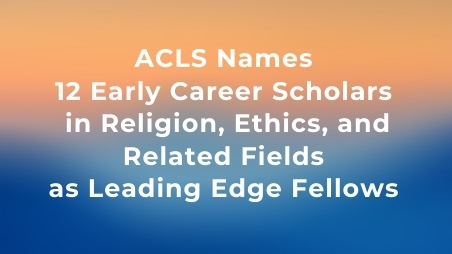The American Council of Learned Societies (ACLS) has announced its second cohort of Leading Edge Fellows. These twelve early-career scholars studying religion, theology, and ethics represent a variety of disciplines across the humanities. They will each partner with a non-profit organization and will bring their skills and perspectives to publicly-engaged projects aimed at understanding and responding to the damage caused by the COVID-19 pandemic.
“In a society that tends to dismiss the social utility and value of humanistic education and habits of thought, ACLS is very pleased to extend its partnership with the Henry Luce Foundation to demonstrate the critical, practical roles of humanists outside academia,” said Joy Connolly, ACLS President. “The Leading Edge Fellows will bring advanced skills in research, writing, analysis, teaching, and outreach in helping organizations across the country advance initiatives that promote equity and justice in communities hit especially hard by the COVID-19 crisis.”
Learn about the fellows and their projects
The American Council of Learned Societies (ACLS) today named 12 new Leading Edge Fellows, the second cohort of this publicly engaged humanities initiative.
In this second round of the fellowship program, 12 dynamic early career scholars whose work investigates religion, theology, and ethics have been placed with non-profit organizations for work starting in early 2021. These fellows represent a wide array of humanistic disciplines, each with their own unique approach to studying ethics and religious life, including theology, religious studies, anthropology, rhetoric, literature, and American studies. Their projects include analysis of the disparate impact COVID-19 on poor and low-income people; designing and executing advocacy projects supporting policy reforms toward a more equitable and ethical democracy; and exploring ethical considerations in COVID-19 vaccine research. This cycle’s partner organizations include the Southern Poverty Law Center, African Communities Together, and the Smithsonian’s National Museum of American History.





